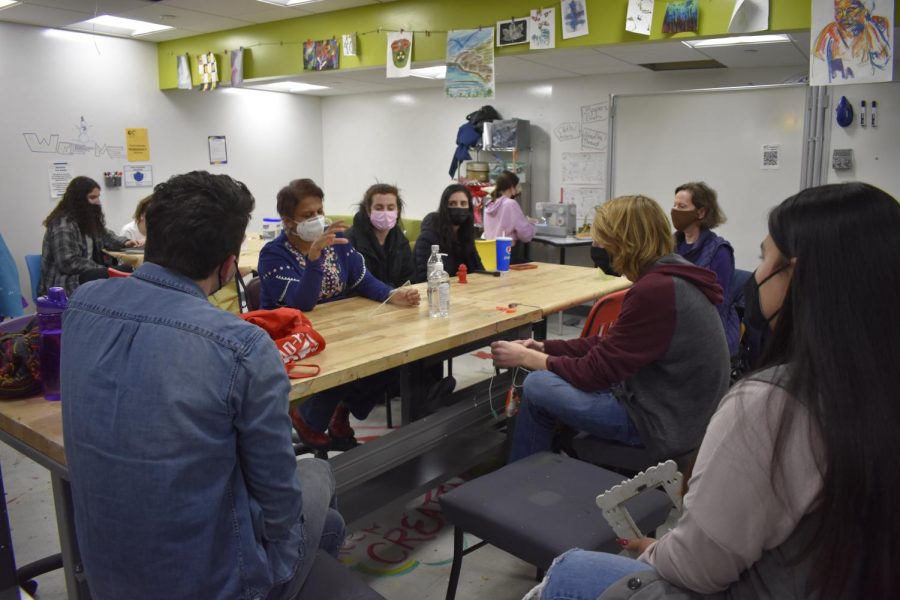C4C encourages writing, performing during One Minute Monologue workshop
Romita Das | Senior Staff Photographer
A group of six Pitt faculty, students and Center for Creativity staff gather at the Center this past Thursday.
February 14, 2022
For Dani Stuchel, the most effective introduction to any speech is short and sweet.
Stuchel, a staff member at Pitt’s Center for Creativity, led a One Minute Monologue workshop last Thursday. He challenged attendees to write a monologue that is 10 lines long — between 100 and 120 words — by the end of the session.
A small group of six Pitt faculty, students and C4C staff gathered in the workshop downstairs at the University Store on Fifth. Participants shared one goal for the workshop 一 to perform their monologues in one minute in front of the rest of the group.
Stuchel said the first minute of any speech is crucial in keeping an audience’s attention.
“People lose attention really quickly, and it’s so important 一 whether you’re performing or you’re giving a talk or a class presentation 一 to really use that first minute to introduce the listener to what’s going to happen, but to also give them the atmosphere you want them to experience,” Stuchel said.
Stuchel said he wanted to teach a workshop on one minute monologues since 2019, when he created a 60-second podcast called “Okay, Art.” In the podcast, Stuchel plays the character of an art critic.
“The podcast is a series of one minute lectures on art that I performed as this character who’s an art critic,” Stuchel said. “I described her as the Amelia Bedelia of art, she gets 90% of [the art] right, and then she’s completely confused on the last detail.”
Stuchel, who has been performing in theater since he was a teenager, opened the workshop with exercises designed to relax participants. He encouraged people to move around and make noise freely so that they could feel more present. He said since he has been performing for so long, he found that opening workshops with such exercises helps performers to feel more comfortable.
“I used to take some classes with Suzie Silver, who is a professor at Carnegie Mellon. She does performance and she always had these great exercises at the beginning where she’d have people line dance or just lay on the floor and stretch out,” Stuchel said. “It’s kind of an old performance gimmick to just make sounds and not worry what you sound like to other people.”
Josh Fratis, a sophomore digital narrative and interactive design major, attended the workshop after finding out about the event on C4C’s website. He said the exercise at the beginning of the workshop helped him get out of his comfort zone.
“Things like that push you out of your comfort zone a little bit, but I felt comfortable in the space. So it was just fun and it helped,” Fratis said.
Fratis said he visited the C4C a few times before the One Minute Monologue workshop, where he has enjoyed drawing and sketching scenes for a personal video game project he’s making. He said the monologue he wrote was a scene in the game.
“It was a cool opportunity, since we had to make our monologues 10 lines long,” Fratis said. “It’s really fun to interpret a script and a character and speak that and perform that 一 it’s even cooler to get to do that for your own writing.”
While some workshop attendees focused on writing fictional monologues, others wrote about more personal manners. Some faculty attended the workshop with the goal of practicing condensing their speech while teaching classes and speaking to various audiences.
Stuchel said it was a new experience for him to lead a workshop with students and faculty attending at once.
“I really liked it because people of different ages and different kinds of life experience bring really different hopes for something like a monologue,” Stuchel said. “There’s just so much nice intergenerational conversation that can happen, so I was really happy that it was this mix of people who could give each other feedback from very different perspectives.”
Britney Yauger, a C4C employee, served as a support person during the workshop. She said although her background is in vocal performance, she had never written her own monologue before the workshop.
“It was a bit tougher than I expected. Especially having to write in such a short time frame. I’m someone that will sit there for hours trying to think of one single line for a piece of writing, but it was a really good challenge to not be fixated on every word,” Yauger said.
One of the exercises in the workshop was to take writing inspiration from a random object. Yauger had an empty picture frame. The resulting monologue was a scene of an emotional phone call during which the main character explains a painful breakup to a close friend. Yauger said she used pauses in her speech to her advantage during her performance.
“I remember when I started acting, I always felt this pressure to be saying something constantly,” Yauger said. “But when you think about when you’re talking about something that’s really deep and personal, you don’t always have the right words readily accessible to you at every single moment. And so, to me, space between words feels like the most realistic thing that I could put into a monologue delivery.”
Stuchel said he was glad the workshop was a success in that many participants experimented with their writing and delivery of their monologues.
“It’s so easy to feel in your head and nervous about what you look like doing something in front of other people,” Stuchel said. “Once you break through that, it becomes really easy to experiment, and that’s what made the workshop an excellent setting to share ideas.”



